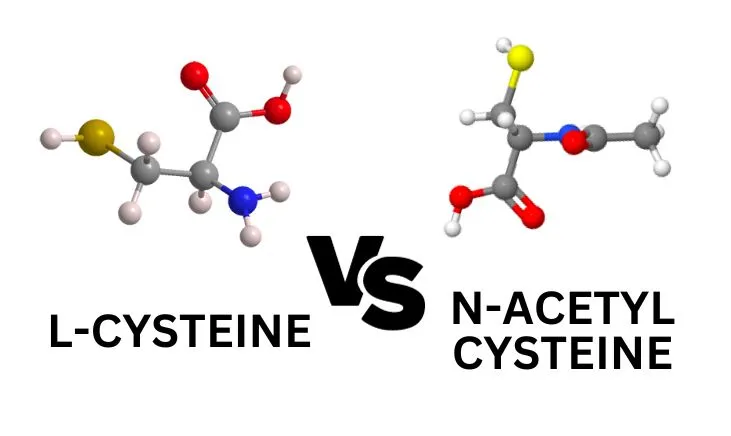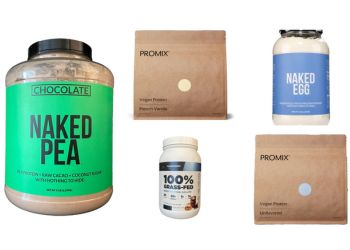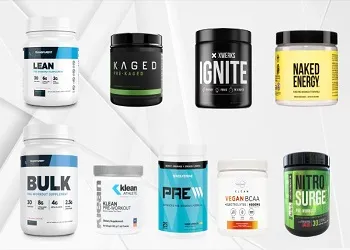L-cysteine is a conditionally essential amino acid produced from serine and methionine, while N-acetyl cysteine (NAC) is the synthetic form of L-cysteine found in most supplements. Both offer benefits for antioxidant defenses, blood sugar regulation, male fertility, respiratory diseases, and cognitive health.
Quick Look
- L-cysteine is a conditionally essential amino acid that can be produced in small amounts in the body—but supplementation is still recommended.
- Blood sugar regulation, antioxidant defenses, immunity, and brain health are some benefits of L-cysteine.
- L-cysteine is the natural form of the amino acid, while NAC is the synthetic form found in supplements.
Table of Contents
What is L-cysteine?
L-cysteine is a conditionally essential amino acid that can be produced in the body in small amounts. However, there are still benefits gained from consuming more cysteine through diet or supplementation.
As a conditionally essential amino acid, cysteine is synthesized from serine and methionine. However, they’re not the only nutrients required. Folate (B9), vitamin B6, and vitamin B12 are also essential for its synthesis.
Like most amino acids, cysteine is a proteinogenic sulfur-containing amino acid involved in the production of functional proteins in the human body; proteins are required for everything from digestion and muscle growth and repair to hormone and enzyme production.
However, one of cysteine’s unique roles is in forming the master antioxidant, glutathione (GSH). Along with the amino acids glutamate and glycine, L-cysteine is a precursor for GSH. But unlike glycine and glutamate, L-cysteine is the rate-limiting factor. If you don’t have enough cysteine, your body can’t produce glutathione—that’s why supplementation is important, even though it’s not essential.
While L-cysteine does play a small role in scavenging free radicals and reducing oxidative stress, its primary function is supporting glutathione production. Researchers believe glutathione is so imperative to overall health that your GSH levels may predict lifespan.
How’s that for important?
But what’s the deal with GSH? As the body’s most important intracellular antioxidant, it shields cellular macromolecules from endogenous and exogenous reactive oxygen and nitrogen species (free radicals). While it can directly quench some free radicals, it’s also heavily involved in dealing directly with the causes of oxidative stress, such as mercury and persistent organic pollutants (POPs).
Key takeaway: L-cysteine is a conditionally essential amino acid that can be produced in small amounts in the body. N-acetylcysteine replenishes glutathione levels and, therefore, offers benefits for antioxidant defenses, detoxification, blood sugar, male fertility, and more.
L-Cysteine Health Benefits
L-cysteine offers some important health benefits to the body thanks to its role in glutathione production.
- Fights Free Radicals

One of cysteine’s most important roles is as an antioxidant molecule. It functions as a scavenger to seek out and neutralize free radicals that cause cellular damage through oxidative stress. It’s also one of three precursor molecules needed to synthesize glutathione, the “master antioxidant.”
Though it offers many benefits, its antioxidant properties are among the most well-known, as it can mitigate oxidative stress—a condition underlying several diseases, from premature aging to cardiovascular disease.
Additionally, L-cysteine can boost glutathione levels to support immune function. Studies suggest that immunological functions in cysteine and glutathione deficiency diseases could be enhanced and potentially restored through L-cysteine supplementation.
Another study found similar results for L-cysteine and immunity. They found that short-term supplementation with NAC could lead to prolonged strengthening of immune defenses in postmenopausal women.
Key takeaway: L-cysteine is required to produce glutathione, the body’s master antioxidant that fights free radicals and reduces oxidative damage.
- Supports Detoxification
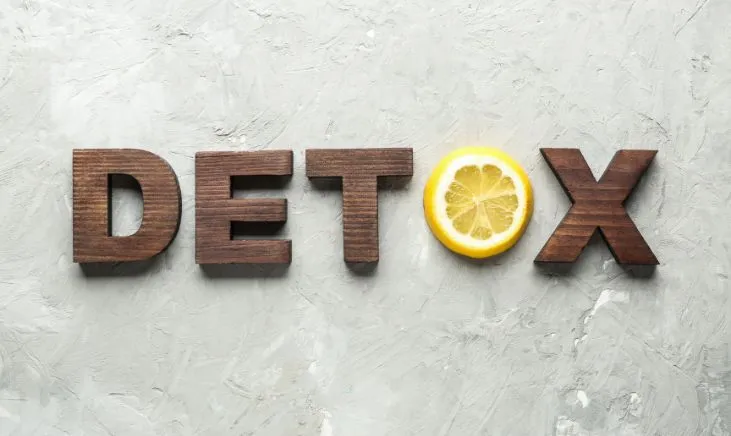
Research published in the Alternative Medicine Review suggests that cysteine plays a vital role in various detoxification mechanisms in the body. Toxic metals have pro-oxidative effects and lead to depleted glutathione levels, and supplementing L-cysteine may help to restore GSH to support proper detoxification of toxins.
- Improves Male Fertility

Infertility is a problem worldwide, but it’s not just women who are the subjects—male infertility accounts for roughly 40-50% of all infertility cases. Studies suggest about 2% of all men will exhibit some form of suboptimal sperm function.
Thanks to its role in managing oxidative stress and reviving GSH levels, cysteine supplementation has been touted as a beneficial treatment for male impotence. A 2016 study published in the International Journal of Fertility and Sterility found that NAC supplementation may effectively treat male infertility from clinical varicocele. In this condition, veins that transport oxygen-depleted blood away from the testicle become enlarged inside the scrotum.
Results showed that sperm concentration improved following NAC supplementation, and the percentage of clinical pregnancy in the group taking NAC was 33% compared to 10% for the control group.
- Balances Blood Sugar

High blood sugar and obesity lead to inflammation in fat tissue, which can damage insulin receptors and increase the risk of developing type 2 diabetes. Research shows that L-cysteine can help support the body’s natural ability to regulate blood sugar levels.
A 2009 animal study demonstrated that L-cysteine supplementation could lower glycemia and markers of vascular inflammation in diabetic patients, while another study found that NAC may help stabilize blood sugar by reducing inflammation in fat cells and improving insulin resistance. When insulin receptors are intact and function properly, they can effectively remove sugar from the blood, thereby maintaining sugar levels within normal limits.
- Improves Respiratory Symptoms
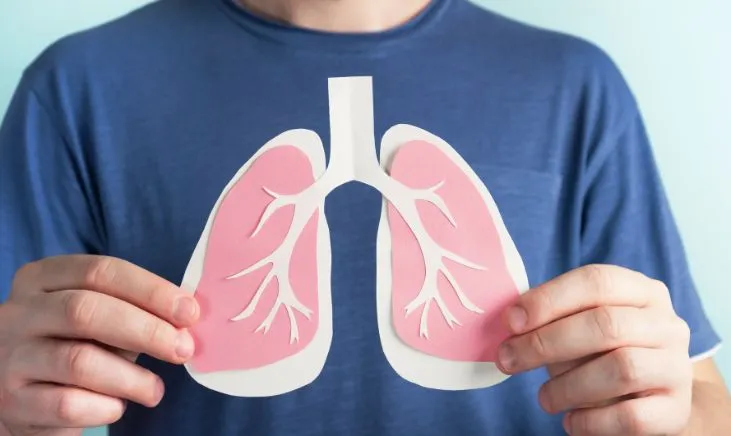
Because of its antioxidant and expectorant properties (it helps thin secretions in the airway and loosens mucus), L-cysteine may help relieve symptoms of respiratory conditions. It may help reduce the severity and frequency of wheezing and respiratory attacks by increasing glutathione levels and thinning the mucus in the bronchial tubes.
For people struggling with allergy symptoms or certain respiratory conditions like bronchitis or chronic obstructive pulmonary disease (COPD), this can help relieve symptoms.
People with COPD experience oxidative damage and inflammation in lung tissue, which leads to airway constriction, shortness of breath, and coughing/wheezing. Some research suggests that L-cysteine supplements may relieve some COPD symptoms and attenuate lung function decline.
People who suffer from chronic bronchitis can also benefit from cysteine supplements. Bronchitis arises when mucous membranes in the lungs’ bronchial passageways become inflamed and reduce airflow to the lungs. Cysteine may help thin the mucus in the bronchial tubes and boost glutathione levels, decreasing the severity and frequency of bronchitis symptoms.
Some research suggests cysteine may also improve other lung and respiratory tract conditions, such as asthma, cystic fibrosis, and pulmonary fibrosis, along with nasal and sinus congestion from allergies or infections.
Key takeaway: L-cysteine antioxidant and expectorant properties can help loosen mucus and reduce inflammation to improve lung function and reduce symptoms of various respiratory conditions.
- Supports Cognitive Health

As mentioned, L-cysteine is important for maintaining glutathione levels, but it’s also needed to regulate brain glutamate levels. Glutamate is an excitatory neurotransmitter involved in memory, cognition, and mood regulation, while glutathione helps reduce brain cell oxidative damage linked to aging and neurodegenerative diseases. Because of its role in regulating glutamate levels and replenishing glutathione, L-cysteine and NAC may be beneficial for conditions affecting the brain and memory.
Here are two scenarios:
- Studies suggest that cysteine supplementation may slow the loss of cognitive abilities in people with Alzheimer’s disease.
- Cellular oxidative damage and reduced antioxidant capacity both contribute to the development and progression of Parkinson’s disease, and studies show NAC supplements can improve dopamine function and specific disease symptoms.
Several studies suggest cysteine positively impacts brain health, but more research is needed to confirm this.
What is N-Acetyl Cysteine?
NAC is the synthetic form of the cysteine. It was approved by the Food and Drug Administration (FDA) and recognized by the World Health Organization (WHO) as an essential drug commonly used to treat acetaminophen overdose and, more recently, as a mucolytic agent to treat symptoms of respiratory diseases.
As with cysteine, the primary role of NAC is linked to its antioxidant and anti-inflammatory activity, so it’s frequently used for therapeutic purposes in treating diseases linked to oxidative stress.
Like its natural counterpart, the bioavailability of NAC isn’t terrific—less than 10%—and only a tiny amount of the intact molecule reaches the plasma and tissues. Once metabolized, the primary metabolic products include:
- Cysteine
- Cystine
- Inorganic sulfate
- Glutathione
L-Cysteine vs NAC: Similarities and Differences
When it comes to L-cysteine and NAC, the differences aren’t significant, but here’s a breakdown of the two:
| L-cysteine | NAC | |
|---|---|---|
| Primary use | Protein synthesis and as the precursor to glutathione | Mucolytic agent and to treat acetaminophen poisoning |
| Chemical structure | 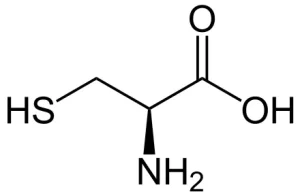 | 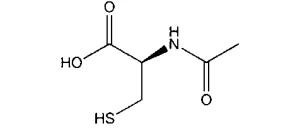 |
| Molecular formula | C3H7NO2S | C5H9NO3S |
| Therapeutic uses | Free-radical scavenger | Antiviral |
| Expectorant | Expectorant | |
| Free-radical scavenger (antioxidant) |
What’s the Difference Between L-Cysteine and NAC?
With both names containing cysteine, it’s easy to ask yourself, “Is L-cysteine the same as NAC?”
In the simplest sense, no.
Cysteine is a natural amino acid produced in small amounts in the body, while NAC is an acetylated variant and precursor to L-cysteine.
Through the role of cysteine, NAC metabolically contributes to two essential physiological functions:
- Antioxidant activity via glutathione
- The regulation of the glutamatergic system
Let’s break those down.
Antioxidant Activity
With respect to its antioxidant activity, the cysteine component of NAC combines with two other amino acids, glutamate and glycine, all of which are precursors for glutathione synthesis. During GSH production, cysteine is the rate-limiting step, meaning if there aren’t sufficient amounts of cysteine, GSH production suffers.
Because of its powerful antioxidant activity, GSH is integral for the immune system to exert its full potential. Although you can buy GSH supplements, oral bioavailability isn’t great, so taking its precursor, NAC, is a more suitable alternative.
NAC is also used in the treatment of various psychiatric conditions due to their oxidative stress component, such as schizophrenia, bipolar disorder, depression, and anxiety disorders.
Glutamatergic Regulation
In addition to its role as an antioxidant, NAC also supplies cysteine for the glutamatergic system. In this metabolic role, NAC influences or modulates the glutamatergic system, which is involved in several functions, including memory, cognition, mood, and reward-seeking repetitive behaviors. These processes may contribute to specific psychiatric conditions characterized by impulsive or compulsive behaviors.
Key takeaway: Cysteine and NAC are similar molecules, but cysteine is a natural amino acid produced endogenously, while NAC is an acetylated variant and precursor to L-cysteine.
Cysteine and NAC Side Effects
NAC supplementation is generally considered safe for most people. Still, very high doses of more than seven grams can be toxic to cells—if you’re taking NAC to treat specific conditions, it’s important to keep tabs on your intake.
If you’re taking any of the following medications, avoid NAC supplementation:
- Immunosuppressants
- Oxiconazole (antifungal)
- Nitroglycerin and isosorbide (antihypertensives)
- Activated charcoal
- Anticoagulant/antiplatelet drugs
Some people may also experience side effects from L-cysteine supplements. These include:
- Dry mouth
- Dizziness
- Headache
- Nausea
- Vomiting
Wrap Up
At first glance, cysteine and NAC might seem like the same compound, and while they have many similar functions and health benefits, they’re not identical. NAC is an acetylated variant of cysteine that’s also a precursor to cysteine synthesis. Cysteine is produced in small amounts in the body, while NAC is a supplemental form. But even though your body can produce small amounts of cysteine, there’s no harm in adding an NAC supplement into the mix to maximize the health benefits of this amino acid.
Frequently Asked Questions
Is L-cysteine the same as NAC?
Cysteine is a natural amino acid, whereas N-acetyl cysteine is an acetylated variant and a precursor to L-cysteine. NAC is slightly more stable than L-cysteine due to the addition of an acetyl group (CH3CO) and is more water soluble and slightly more bioavailable than cysteine.
Is there a difference between NAC and L-cysteine?
Yes. NAC is a derivative of cysteine; it has an acetyl group attached to the nitrogen atom. As such, the chemical formula of the two molecules differs slightly—cysteine (C3H7NO2S) vs NAC (C5H9NO3S).
Does L-cysteine turn into NAC?
No—L-cysteine is a natural amino acid produced in the body. NAC is the precursor to L-cysteine, which is then converted into glutathione, a powerful antioxidant.
Who should avoid taking NAC?
People taking immunosuppressants, oxiconazole (antifungal), nitroglycerin, isosorbide (antihypertensives), activated charcoal, or anticoagulant/antiplatelet drugs should avoid taking NAC supplements. Pregnant or breastfeeding women should confirm with their healthcare provider before taking NAC supplements.
